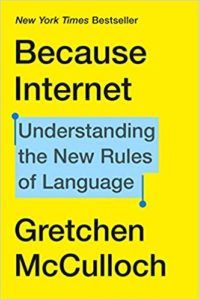
The Art of the Vulgar Tongue: Slang’s Evolution
Do you ever wonder how slang shifts so quickly?
Slang terms can evolve, like how “social network” referred to in-person networking (Oxford English Dictionary added it in 1973). Some overlap, as in Captain Francis Grose’s A Classical Dictionary of the Vulgar Tongue (first published in 1785, it was just recently republished in pocket-size form). According to the book’s introduction, Grose compiled the lexicon with terms he overheard in “slums, dockyards, and taverns”. Many are still avidly used (“brat”, “sandwich”). As with slang of any era, some did not stand the test of time (I haven’t heard anyone describe sex as “blanket hornpipe”, unfortunately).
Given the current volatility of modern culture, it’s unsurprising that many examples of 2020’s most popular slang includes terms like “Karens”, “OK Boomer”, “cancel/canceled” and “tea”. “Karens” and “OK Boomer” are used dismissively, while the word “tea” stands in for truth. “Cancel/canceled” is pretty self-evident. These are words for expressing anger and frustration.
Now, popular language changes rapidly because we have constant access to new terminology via the internet. So, what makes up our individual speech patterns? In Because Internet: Understanding the New Rules of Language, linguist Gretchen McCulloch uses the example of “soda” to showcase how a name of a word can vary across regions (“pop” or “coke” elsewhere).

I’ll give you an example—Montreal Anglophones have some very specific vocabulary that isn’t known widely in the rest of Canada. For us, a common pizza flavor is “all-dressed” (from the French pizza toute garnie) and it means the pizza has pepperoni, mushrooms, and green peppers. Now I live in Vancouver, and once I ordered a pizza over the phone and requested it be “all-dressed”. When I said that, the man on the phone hesitated before agreeing. The pizza we got was covered in every topping the pizzeria had (yum, but expensive). My partner and my roommate had also never heard of “all-dressed” pizza, so I Googled it and discovered the pizza type was region-specific. Just as we don’t know slang from other parts of the world, we often don’t have knowledge of slang variations from within our country.
The internet is changing that and making it easier to learn how people actually speak to each other in a casual, informal way. McCulloch emphasizes Twitter’s usefulness on this front, writing that “even the most casual of searchers can look for a word or phrase and form an impression of how people are using it…’bae’ was used primarily by African Americans until around 2014, when it started appearing in tweets by white people, only to get co-opted by brands shortly thereafter.”
Internet Slang
These days, internet/tech slang is used to shorten a word or phrase—mostly to reduce word count and increase readability (“tl;dr”). One of the first mainstream acronyms of internet slang was “lol” (originally “LOL”) for “laugh out loud”. McCulloch suggests that the earliest use of the term was by Wayne Pearson in the 1980s. In 2011, the term was popularized enough to be added into OED. Being added takes time, as Fiona McPherson, OED’s senior editor in the new words group, told BBC News: “We need evidence that people are using a word over a period of time.” Internet slang is spoken as well as typed.
Emoticons and Emojis
These are also used to reduce word count. 🙂 and the like came up in 1990s emails and chatrooms. In 1999, Japanese artist Shigetaka Kurita created emojis and by the mid-2000s, they were available worldwide. Now emojis are “the first language born of the digital world”, Pardes suggested in Wired. Over time, people began to question representational aspects of emojis—skin color, food types, etc. In 2015, users were given the ability to shift between different skin tones. With every successive update, social context informs new additions—as of last year, there are now emojis representing people with disabilities.
The Importance of Context
Along with the internet, new slang is often derived from pop culture (‘Damn, Gina’ from TV’s Martin) and music (‘flex’ is from hip hop culture).
Nevertheless, it can be easy to pick up new language without knowing its background history. How many people “Yaaaaas Qweeen”ed without realizing the term predated Broad City and came from 1980s Ballroom Culture’s drag slang? Reply All has a great episode about this. Popular 2010s expressions such as “kiki”, “slay”, “tea”, and “shade” are also drag slang.
In 2017, these phrases gained mainstream popularity through RuPaul’s Drag Race. The Queen (1968) and Paris is Burning (1990), documentaries well known by the gay community, had already spread drag slang from the Latinx and Black Ball scene to wider gay culture. As Lexi Pandell explained in Wired, using slang from other cultures can be problematic when we forget to acknowledge context. Appropriating the language (and clothes, and music, and…) of communities of color has been a long-time cultural issue, as it causes a loss of important identity markers. When these markers are adopted by others, the ability to bond over the words is chipped away.
Slang is a shorthand, not just to language but to what links us together. If I say “As if” and someone recognizes it from Clueless, we have a shared experience without asking what year they were born. As our connective links evolve, so does the language that surrounds it and those new meanings can reveal a lot about us.














